
We do our best to use the words in the rules and card abilities carefully; specific words are not synonymous no matter how similar they seem. For example, destroy, discard, move, place, play, and return are all different things done with or to cards.
This means that a card that cannot be destroyed can still be returned or discarded. In this section we clarify what the specific words mean.
-
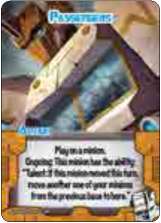
A Minion: Any minion in play, unless stated otherwise.
Exception: "Play a minion" means one from the hand.
-
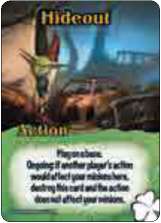
Affect: A card is affected if it is moved or transferred, removed from play (e.g., destroyed, returned, shuffled, or placed), changed in power or controller, has an action or counter attached, or its ability canceled.
Removing an attached +1 power counter is considered to affect the card that it was attached to; but removing an attached action is not considered to affect the card that it was attached to, even if that indirectly changes the card's power, abilities, etc.
Credit for affecting a card goes to the controller of the card that explicitly mandated the effect.
Exception: If the card specifies a different player to carry out an effect, that player gets the credit.
-
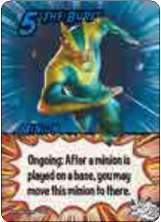
After: "After X do Y" means you resolve X completely before you start doing Y. If X does not happen, neither does Y. You must do Y immediately after X, meaning before the current player does some other activity that does not depend on X. (Use common sense and courtesy when applying this rule).
Exception: "After a base scores" means after the VP are awarded, not after the new base is chosen.
-
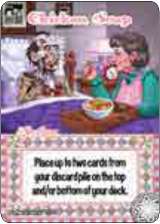
And/Or: "X and/or Y" means X by itself, or Y by itself, or both X and Y.
-
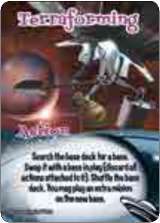
Attachments: Anything that is attached to or played on a card, like other cards or power counters.
-
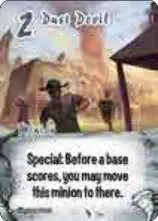
Before a Base Scores: After a base has been chosen to be scored, but before VPs have been awarded.
-
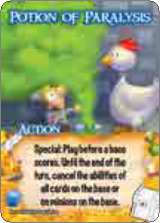
Cancel: Canceling an ability means the ability is treated as if it does not exist. Canceling does not undo previous effects created by the ability.
-
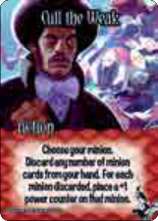
Control: By default, each card you play is controlled by you. If you gain control of a card, it is as if you had played it: minions add to your power total, abilities on the card apply to you and you can use them, etc.
Controlling a minion does not mean you control any actions played on it, but their abilities apply to the minion normally. When the card leaves play, it goes to the hand, deck, or discard pile of its owner.
-
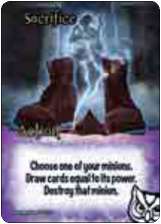
Destroy: This lets you remove a card that's in play and put it into the appropriate discard pile.
-
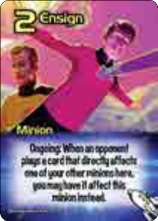
Directly Affects: Card X directly affects card Y if X's ability does one of the things listed under "Affect", and Y is a target specified by X.
-
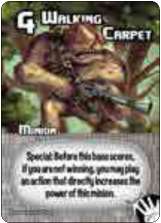
Directly increases power: A card directly increases power if it gives it "+N power", or places or transfers a +1 power counter, or sets the printed power to a higher value.
Granting a power-increase talent (e.g. The Touch), or destroying a negative power card (e.g. Change Into A Gun) are not direct power increases.
-
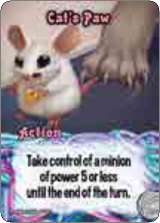
Discard: This lets you put a card that is not in play or has just been scored into the appropriate discard pile. It comes from your hand unless it says otherwise.
-
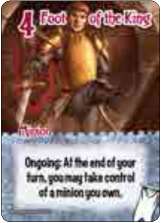
End of a turn: The phrase "end of the turn" means the end of the current player's turn; "end of your turn" means the end of your current turn if you are the current player, or the end of your upcoming turn if you are not the current player.
-
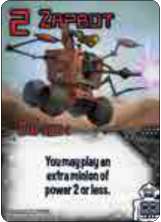
Extra: An extra minion or action is one that is not counted against your normal limit of one per type per turn. You may always play it immediately.
If an ability gives you an extra card during the Play Cards phase, you may play it later in the phase unless it refers to a specific card, or it was given by a Special ability. Like regular cards, extra cards are optional.
-
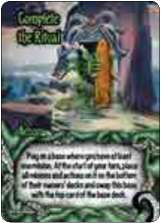
Have: You have cards at a base if and only if you control the cards.
-
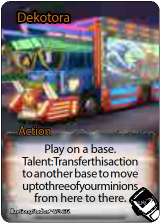
Here: "Here" refers to the base that the card currently occupies, or to the base itself if a base says "here". "Move a card here" means "move a card to here" unless another destination is specified.
-
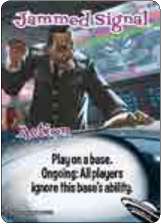
Ignore an Ability: Ignoring a base's ability means: you do not follow a base's instructions, you are not subject to its restrictions, and your cards are neither affected nor protected by its ability.
-
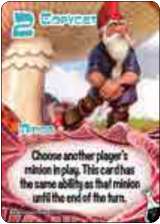
In Play: Cards in play are in the middle of the table, i.e., an active base, a card on an active base, or a card on a minion.
Cards are in play once they hit the table, even before their ability is resolved. Cards in the hand, deck, discard pile, or set aside, or in the box, are not in play.
-
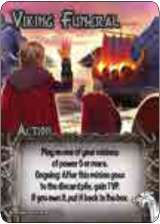
In the box: A card that is in the box is entirely removed from play. Treat it as if it doesn't exist for the duration of the game.
-
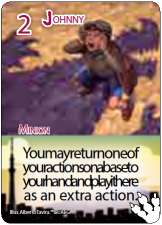
May: The phrase "You may do X" means you are allowed to do X, but are not required to do X.
"You may do X and Y" means you either do both X and Y, or neither X nor Y; you cannot opt to do just one of them.
-
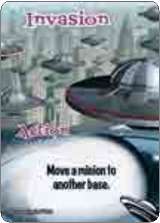
Move: This lets you relocate a minion or titan from one base to another, along with any cards or counters on it.
Moving a card does not count as playing it. On-play (i.e unlabelled) abilities do not trigger when you move a card.
-
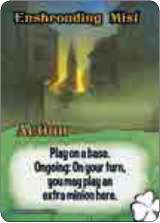
On Your Turn: This means during the normal Play Cards phase of your turn.
You can only do it once per turn unless it says otherwise.
-
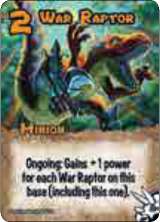
Ongoing: Most abilities happen and then they're over, or else they end at the end of the turn.
Ongoing abilities are active for as long as they're in play, and/or they trigger at some later time while in play. Ongoing abilities do not work from the hand, deck or discard pile.
-
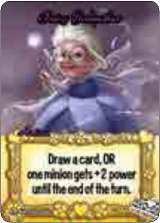
Or: "X OR Y", with "OR" typeset in all capitals, means the controller chooses either X or Y to happen, but cannot choose both.
-
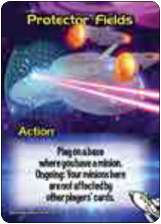
Other Players: Everyone except "you".
-
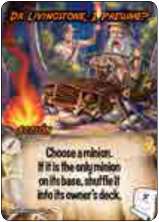
Owner: The player who had the card at the start of the game. Monsters and treasures have no owner.
-
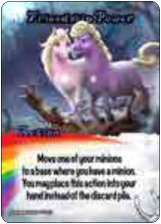
Place: This lets you relocate a card in a way not covered by other terms, such as from a base to the bottom of your deck, or from the discard pile to your hand.
-
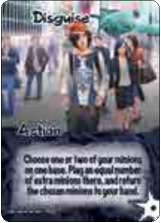
Play: You play a card when it's one of the free cards you get in the Play Cards phase, or any time an ability specifically says that you're playing it. A card's ability happens when you play it.
When cards are moved, placed, returned, or transferred, they're not being played, and their abilities don't happen.
-
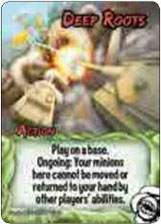
Player's abilities: The abilities on the cards the player controls. This includes minions, actions, and titans, but not cards the player doesn't control like bases or monsters.
Players do not have abilities for themselves, separate from their cards.
-
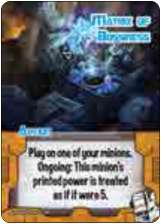
Printed Power: The number physically printed on the card. The printed power is also the starting power of a card, unless an ability changes it.
-
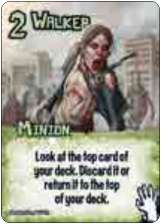
Return: This sends a card back to where it came from. When a card returns from a base, discard attachments on that card and place it in its owner's hand.
-
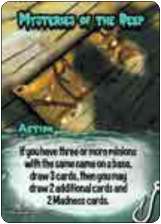
Same Name: A group of one or more cards that all have identically matching card titles.
Two or more Ninja Acolytes are such a group, but partial matches like a Ninja Acolyte / Ninja Master do not count. A single card always counts as a group of cards with the same name.
-
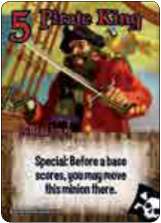
Special: Special abilities happen at unusual times or in unusual ways, as described in the abilities themselves. (E.g. they might trigger on a card already in play, or in your hand or discard pile).
A card played using a Special ability doesn't count as one of your free cards for the turn. If a Special must be played when its conditions don't allow it, it is discarded instead.
-
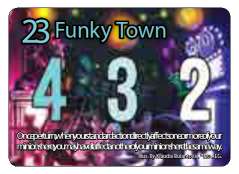
Standard: A standard action is one that does not say "Play on a base" or "Play on a minion". It does its job and leaves.
-
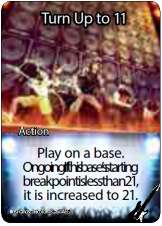
Starting: The power of a minion, or the breakpoint of a base, before being modified by other abilities (or by monsters for breakpoints).
Normally this is the number printed on the minion or base, but some cards can change it.
-
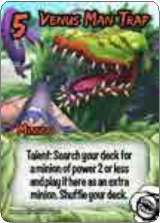
Talent: This is an ability that the card may use once during the Play Cards phase of each of its controller's turns.
Using a talent is optional, and a talent can be used at any time during the Play Cards phase.
-
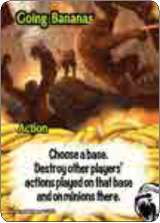
There: This means the location just referred to by the card text.
-
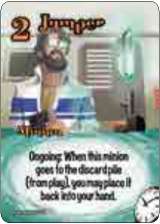
This: "This" usually refers to the card itself.
If it refers to a different type of card (e.g., a minion with the text "this base"), then it means the card of that type that it is played on; in such cases, "this" has no meaning on a card that is not in play.
-
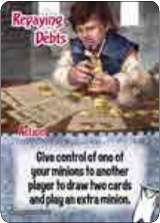
To: Some cards say, "Do X to do Y" (e.g. "Discard cards equal to a minion's power to destroy it"). With these cards, if doing X completely is thwarted for any reason (e.g., you don't have enough cards in hand), then you can't do any of X, or do Y either.
If two or more cards tell you to do X to make something else happen, you cannot have that same X count for multiple cards. So there.
-
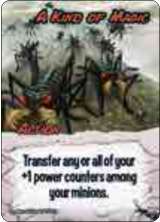
Transfer: This lets you relocate actions or power counters from one card to another. When adding counters to your cards (from the pool), or discarding counters from your cards (to the pool), that's not transferring.
If the target of the transfer is immune to effects, the transferred card or token is discarded instead.
-
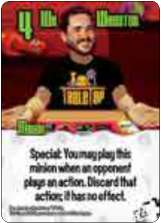
When: "When scoring" means at the time VP rewards are distributed. For uses other than scoring, "when X" means as X starts happening (typically, you interrupt the part of X that is pertinent to the ability of the card that says, "when".
If there is nothing to interrupt, then "when X" acts just like "after X" and you've discovered a card that we made an error on).
-
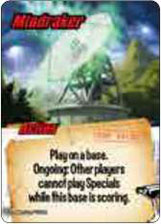
While: In general, "while X" means as long as X is true. "While scoring" means any time during the Score Bases phase, from the moment the base is chosen to score until it is discarded and replaced by a new base.
-
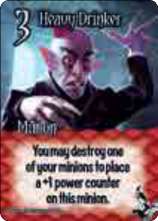
You: On a minion, action, or titan, "you" means the controller of the card. On a base, it means any player it describes, which is usually the current player.
-
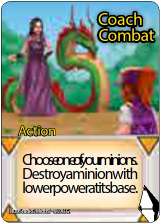
Your: When referring to cards in play, this means cards you control, no matter which faction or deck they are from.
Continue Reading


